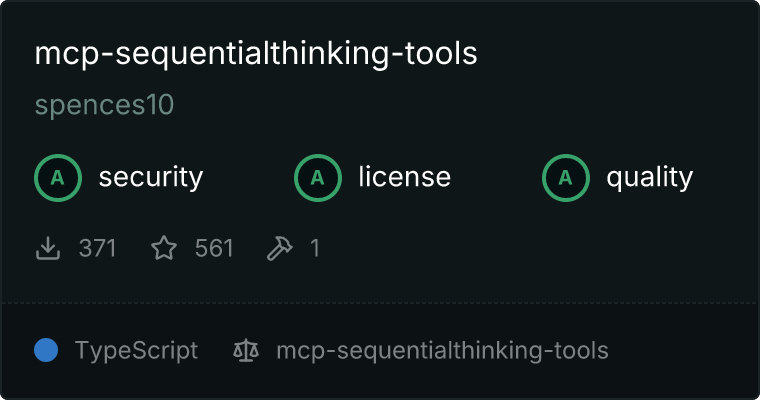mcp-sequentialthinking-tools
An adaptation of the MCP Sequential Thinking Server designed to guide tool usage in problem-solving. This server helps break down complex problems into manageable steps and provides recommendations for which MCP tools would be most effective at each stage.

A Model Context Protocol (MCP) server that combines sequential thinking with intelligent tool suggestions. For each step in the problem-solving process, it provides confidence-scored recommendations for which tools to use, along with rationale for why each tool would be appropriate.
Features
- 🤔 Dynamic and reflective problem-solving through sequential thoughts
- 🔄 Flexible thinking process that adapts and evolves
- 🌳 Support for branching and revision of thoughts
- 🛠️ Intelligent tool recommendations for each step
- 📊 Confidence scoring for tool suggestions
- 🔍 Detailed rationale for tool recommendations
- 📝 Step tracking with expected outcomes
- 🔄 Progress monitoring with previous and remaining steps
- 🎯 Alternative tool suggestions for each step
How It Works
This server analyses each step of your thought process and recommends appropriate MCP tools to help accomplish the task. Each recommendation includes:
- A confidence score (0-1) indicating how well the tool matches the current need
- A clear rationale explaining why the tool would be helpful
- A priority level to suggest tool execution order
- Alternative tools that could also be used
The server works with any MCP tools available in your environment. It provides recommendations based on the current step's requirements, but the actual tool execution is handled by the consumer (like Claude).
Example Usage
Here's an example of how the server guides tool usage:
{
"thought": "Initial research step to understand what universal reactivity means in Svelte 5",
"current_step": {
"step_description": "Gather initial information about Svelte 5's universal reactivity",
"expected_outcome": "Clear understanding of universal reactivity concept",
"recommended_tools": [
{
"tool_name": "search_docs",
"confidence": 0.9,
"rationale": "Search Svelte documentation for official information",
"priority": 1
},
{
"tool_name": "tavily_search",
"confidence": 0.8,
"rationale": "Get additional context from reliable sources",
"priority": 2
}
],
"next_step_conditions": [
"Verify information accuracy",
"Look for implementation details"
]
},
"thought_number": 1,
"total_thoughts": 5,
"next_thought_needed": true
}
The server tracks your progress and supports:
- Creating branches to explore different approaches
- Revising previous thoughts with new information
- Maintaining context across multiple steps
- Suggesting next steps based on current findings
Configuration
This server requires configuration through your MCP client. Here are examples for different environments:
Cline Configuration
Add this to your Cline MCP settings:
{
"mcpServers": {
"mcp-sequentialthinking-tools": {
"command": "npx",
"args": ["-y", "mcp-sequentialthinking-tools"]
}
}
}
Claude Desktop with WSL Configuration
For WSL environments, add this to your Claude Desktop configuration:
{
"mcpServers": {
"mcp-sequentialthinking-tools": {
"command": "wsl.exe",
"args": [
"bash",
"-c",
"source ~/.nvm/nvm.sh && /home/username/.nvm/versions/node/v20.12.1/bin/npx mcp-sequentialthinking-tools"
]
}
}
}
API
The server implements a single MCP tool with configurable parameters:
sequentialthinking_tools
A tool for dynamic and reflective problem-solving through thoughts, with intelligent tool recommendations.
Parameters:
thought (string, required): Your current thinking stepnext_thought_needed (boolean, required): Whether another thought step is neededthought_number (integer, required): Current thought numbertotal_thoughts (integer, required): Estimated total thoughts neededis_revision (boolean, optional): Whether this revises previous thinkingrevises_thought (integer, optional): Which thought is being reconsideredbranch_from_thought (integer, optional): Branching point thought numberbranch_id (string, optional): Branch identifierneeds_more_thoughts (boolean, optional): If more thoughts are neededcurrent_step (object, optional): Current step recommendation with:
step_description: What needs to be donerecommended_tools: Array of tool recommendations with confidence scoresexpected_outcome: What to expect from this stepnext_step_conditions: Conditions for next step
previous_steps (array, optional): Steps already recommendedremaining_steps (array, optional): High-level descriptions of upcoming steps
Development
Setup
- Clone the repository
- Install dependencies:
pnpm install
- Build the project:
pnpm build
- Run in development mode:
pnpm dev
Publishing
The project uses changesets for version management. To publish:
- Create a changeset:
pnpm changeset
- Version the package:
pnpm changeset version
- Publish to npm:
pnpm release
Contributing
Contributions are welcome! Please feel free to submit a Pull Request.
License
MIT License - see the LICENSE file for details.
Acknowledgments
